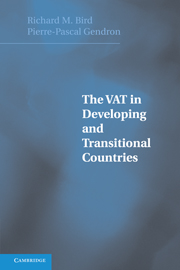Book contents
- Frontmatter
- Contents
- List of Tables
- Preface
- 1 Why This Book?
- 2 The Rise of VAT
- 3 Is VAT Always the Answer?
- 4 Trade and Revenue
- 5 Equity and the Informal Sector
- 6 What Should Be Taxed?
- 7 Key Issues in VAT Design
- 8 New Issues in VAT Design
- 9 Administering VAT
- 10 Dealing with Difficulties
- 11 The Political Economy of VAT
- 12 Where Do We Go from Here?
- Annex
- References
- Index
3 - Is VAT Always the Answer?
Published online by Cambridge University Press: 16 November 2009
- Frontmatter
- Contents
- List of Tables
- Preface
- 1 Why This Book?
- 2 The Rise of VAT
- 3 Is VAT Always the Answer?
- 4 Trade and Revenue
- 5 Equity and the Informal Sector
- 6 What Should Be Taxed?
- 7 Key Issues in VAT Design
- 8 New Issues in VAT Design
- 9 Administering VAT
- 10 Dealing with Difficulties
- 11 The Political Economy of VAT
- 12 Where Do We Go from Here?
- Annex
- References
- Index
Summary
Will VAT continue to spread? We think so. One reason we say this is that we think that income taxation offers an increasingly shaky fiscal foundation for many developing and transitional countries. Income taxes are usually more technically complex, more administratively demanding, more vulnerable to erosion and competition, and even less politically popular than consumption taxes (Bird and Zolt 2005). While there is much that can be said in support of income taxes and we think that such taxes continue to have a potentially important role to play in emerging countries, that role is unlikely to be as the mainstay of the fiscal system. General consumption taxes are increasingly likely to rule the fiscal roost, and in most circumstances a VAT is the most sensible form of general consumption tax – both in efficiency terms and, with some qualification, as we discuss later, also in equity, administrative, and revenue terms.
But is VAT always the right answer? Here, we are less certain. For some large subnational jurisdictions (Chapter 8) and some countries, introducing VAT may both make sense and be administratively feasible. However, for some relatively small jurisdictions in which the combination of the ‘border problems’ discussed later and the relatively high cost of administering a consumption VAT may outweigh the economic or revenue gain from doing so, it may not.
Information
- Type
- Chapter
- Information
- The VAT in Developing and Transitional Countries , pp. 28 - 47Publisher: Cambridge University PressPrint publication year: 2007
Accessibility standard: Unknown
Why this information is here
This section outlines the accessibility features of this content - including support for screen readers, full keyboard navigation and high-contrast display options. This may not be relevant for you.Accessibility Information
- 2
- Cited by
